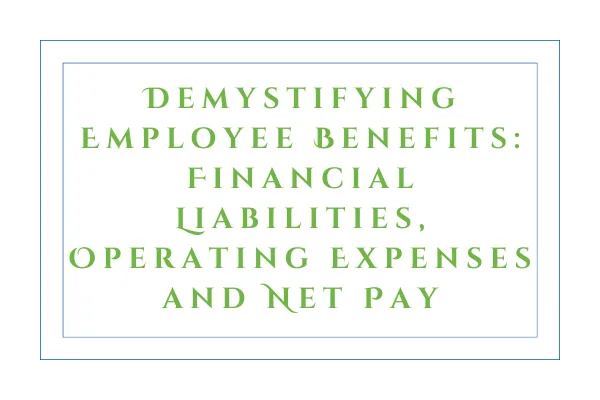
Demystifying Employee Benefits: Financial Liabilities, Operating Expenses and Net Pay
Employee benefits play a crucial role in attracting and retaining top talent, but there can be confusion surrounding their financial implications for businesses. In this blog post, we will delve into the common questions surrounding employee benefits and shed light on whether they are considered financial liabilities, operating expenses, and if they impact net pay. Here at Business Health Market, we love explaining the perks and the faults of your insurance options.
ARE EMPLOYEE BENEFITS FINANCIAL LIABILITIES?
Employee benefits are typically considered financial liabilities for businesses. While they provide valuable support to employees, they come with associated costs that must be accounted for. These costs include contributions to health insurance, retirement plans, paid time off, and other benefits provided to employees.
Financial liabilities arise from the obligation to fulfill these commitments over time, which must be reflected in a company's financial statements and budgets. As a small business owner, you are not legally required to contribute to these plans. The Affordable Care Act can be confusing because on the surface, it looks like if you offer benefits, you have to financially provide for them. In theory yes, but let's break it down a little more.
The Affordable Care Act:
1. Only applies to employers with 50+ employees.
2. Only states that the lowest premium employee only plan being offered cannot exceed 9.12% of your lowest paid full-time employee's salary.
So for small business owners with less than 50 employees, there are no restrictions to worry about. To employers with 50+ employees, just make sure your policies meet the income requirements. Business Health Market always makes sure that whenever possible, your lowest plan already meets the Affordable Care Act Income Percentage so that you don't have to financially pay for the benefits if your company cannot afford to.
Now even if you aren't contributing to these benefits, you are still paying for them. The insurance carrier will bill your business bank account for the full cost of the benefits. Then you will deduct each employee's portion of their benefits from there pay. Therefore, if you are not contributing to the plans, it is technically a wash.
Many small business owners still choose to offer Group Employee Benefits because their employees appreciate the group discount and the ability to have it payroll deducted. Having employee benefits in place will typically increase a company's employee retention by 8 months in most industries, even if the employee doesn't take a plan. Just knowing it is there attributes to retention increases.
ARE EMPLOYEE BENEFITS AN OPERATING EXPENSE?
Yes, employee benefits are generally categorized as operating expenses. Operating expenses are ongoing costs directly related to the day-to-day operations of a business. Employee benefits, such as health insurance premiums, contributions to retirement plans, and other benefits offered, are recurring expenses that contribute to the overall operational costs of the organization. These expenses are necessary to attract and retain talent, maintain employee satisfaction, and ensure compliance with labor laws and regulations.
Keep in mind though, only the amount that you are financially contributing to the plans are deductible for you. If your employee plan costs $350 per month and you are payroll deducting the employees enrolled by $350 per month, you would not reduce your taxes or claim that cost as a deduction. If you contribute $150 per employee per month, that would be a tax deductible event.
Make sure that you keep accurate records or that your insurance carrier has robust reporting and tracking so it is easier for you come tax time.
DO EMPLOYEE BENEFITS INCREASE NET PAY?
Employee benefits do not directly increase an employee's net pay. Net pay refers to the amount an employee receives after deductions, such as taxes, insurance premiums, and retirement contributions, have been subtracted from their gross pay.
While employee benefits may impact the overall compensation package, they are typically not reflected as additional income on an employee's paycheck. However, employee benefits can indirectly enhance an employee's financial well-being by providing valuable coverage and services that they would otherwise have to pay for out of pocket.
In conclusion, Employee benefits are essential for attracting and retaining top talent, but it's important to understand their financial implications for businesses. Employee benefits are considered financial liabilities that need to be accounted for in financial statements and budgets. They are also categorized as operating expenses, reflecting their ongoing costs in the day-to-day operations of a company. While employee benefits do not directly increase net pay, they contribute to an employee's overall compensation package and can enhance their financial well-being by providing valuable coverage and support.
By gaining clarity on the financial aspects of employee benefits, businesses can make informed decisions about designing and managing their benefits programs. At Business Health Market, we specialize in helping businesses navigate the complexities of employee benefits, offering tailored solutions to meet their unique needs. Contact us today to explore how we can support your organization.
Remember, your employees' well-being is a valuable investment that contributes to the success of your business.



